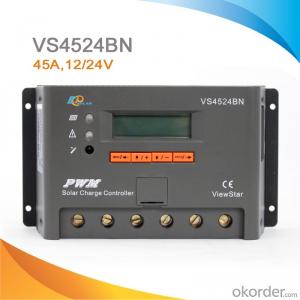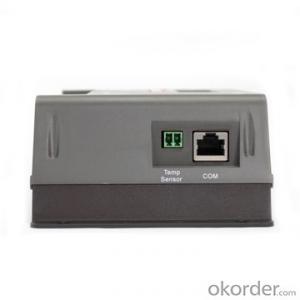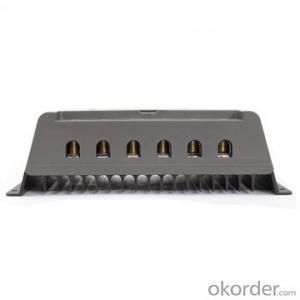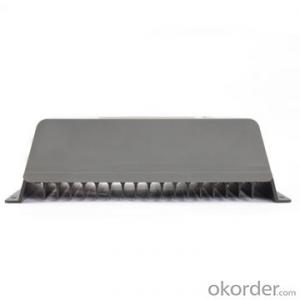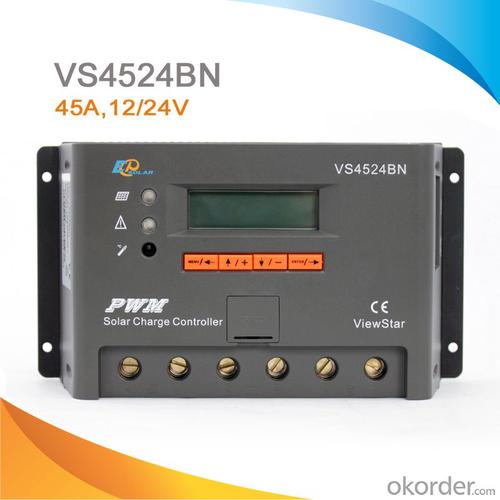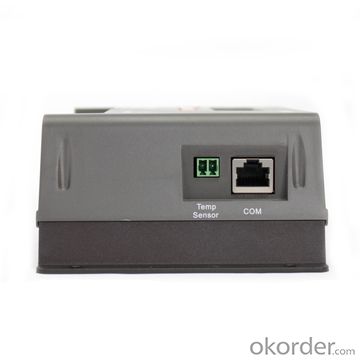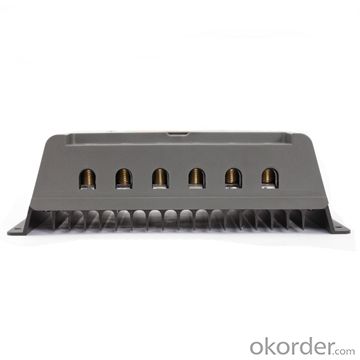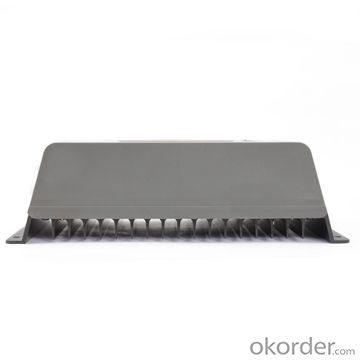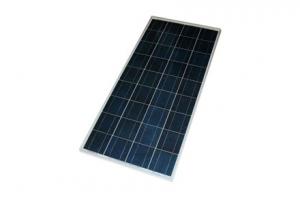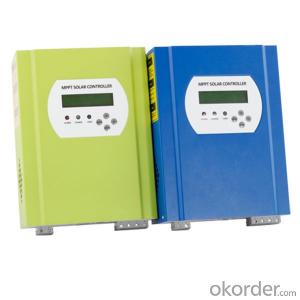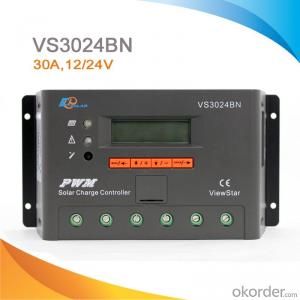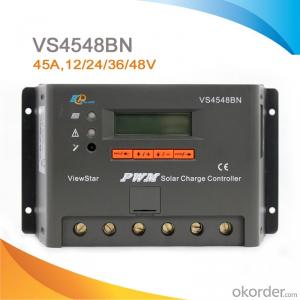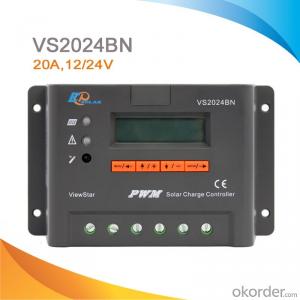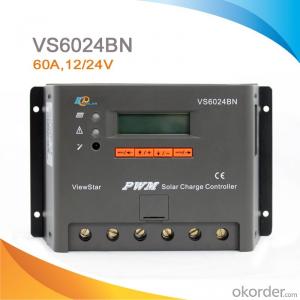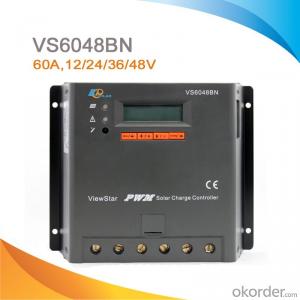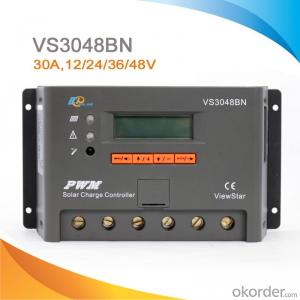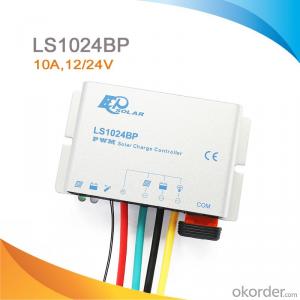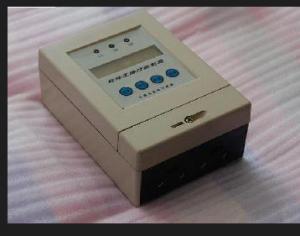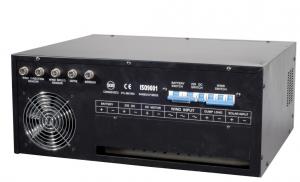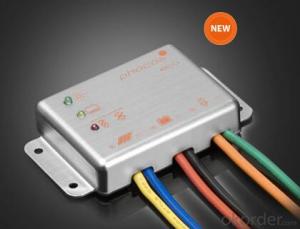Solar Panel Controllers - LCD/LED High Quality PWM Solar System Charge Controller/Regulator with CE ROHS, 45A 12V/24V, VS4524BN
OKorder Service Pledge
OKorder Financial Service
You Might Also Like
Features:
·Excellent EMC design
·32 bit MCU with high speed
·High efficient Series PWM charging
·Four battery type options: Sealed, Gel, Flooded, and USER
·Intelligent lighting and timer control for solar lighting system
·12 bit A/D high-precision sampling to ensure accuracy
·Use MOSFET as electronic switch
·Full control parameters setting and modification, diversified load control mode
·Humanized design of browser interface, undertake every operating conveniently
·Temperature compensation
·Adopt graphics dot-matrix LCD screen and HMI (human-machine interface) with 4 buttons,integrated menu displaying and operation
·Energy statistics function
·RS485 ports with MODBUS communication protocol
·Optional PC monitoring software and remote meter for real-time monitoring and battery management parameter setting
·Field upgradable firmware
Electronic Protections:
·PV short circuit protection
·PV reverse polarity protection
·Battery overcharge protection
·Battery over discharge protection
·Battery reverse polarity protection
·Load overload protection
·Load short circuit protection
·Overheating protection
Specification:
Model | VS1024BN | VS2024BN | VS3024BN | VS4524BN | VS6024BN |
Nominal system voltage | 12V/24V auto work | ||||
Rated battery current | 10A | 20A | 30A | 45A | 60A |
Rated load current | 10A | 20A | 30A | 45A | 60A |
Max. battery voltage | 32V | ||||
Equalize charging voltage | Sealed: 14.6V, Flooded: 14.8V, User-defined: 9~17V | ||||
Boost charging voltage | Gel: 14.2V, Sealed: 14.6V, Flooded: 14.8V, User-defined: 9~17V | ||||
Float charging voltage | Gel /Sealed /Flooded: 13.8V, User-defined: 9~17V | ||||
Low voltage reconnect voltage | Gel /Sealed /Flooded: 12.6V, User-defined: 9~17V | ||||
Low voltage disconnect voltage | Gel /Sealed /Flooded: 11.1V, User-defined: 9~17V | ||||
Self-consumption | ≤15mA(12V); ≤10mA(24V); ≤9mA(36V); ≤8mA(48V) | ||||
Grounding | Common negative | ||||
Temp. compensation | -3mV/°C/2V | ||||
Relative humidity | 10%~90% Non-condensation | ||||
Communication | RS485 / RJ45 interface | ||||
LCD temperature | -20°C ~ +70°C | ||||
Working temperature | -25°C ~ +55°C | ||||
Humidity | ≤95% N.C. | ||||
Enclosure | IP30 | ||||
Overall dimension | 162x85x40mm | 162x100x50mm | 200x103x58mm | 201x109x59mm | 205x129x67mm |
Terminals | 4mm2 | 10mm2 | 16mm2 | 35mm2 | 35mm2 |
Net weight | 0.2kg | 0.4kg | 0.7kg | 0.9kg | 1.3kg |
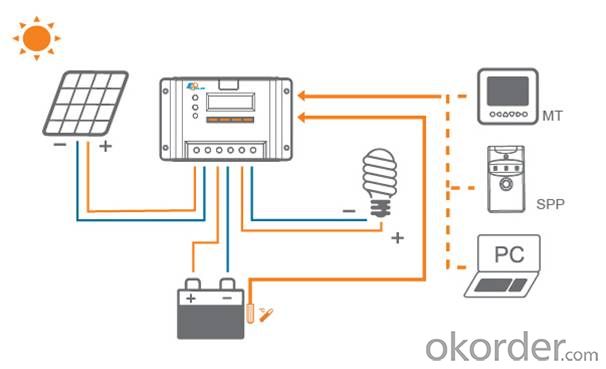
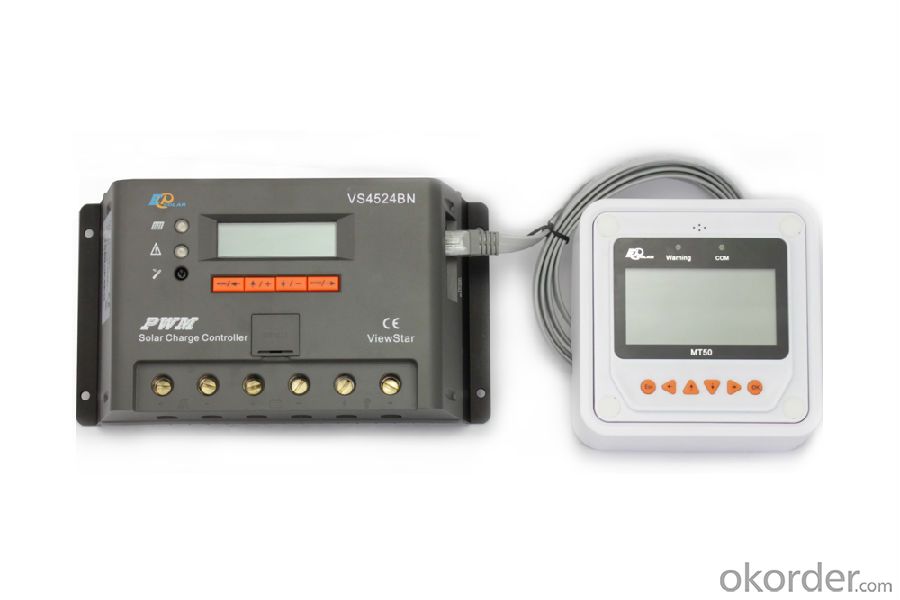
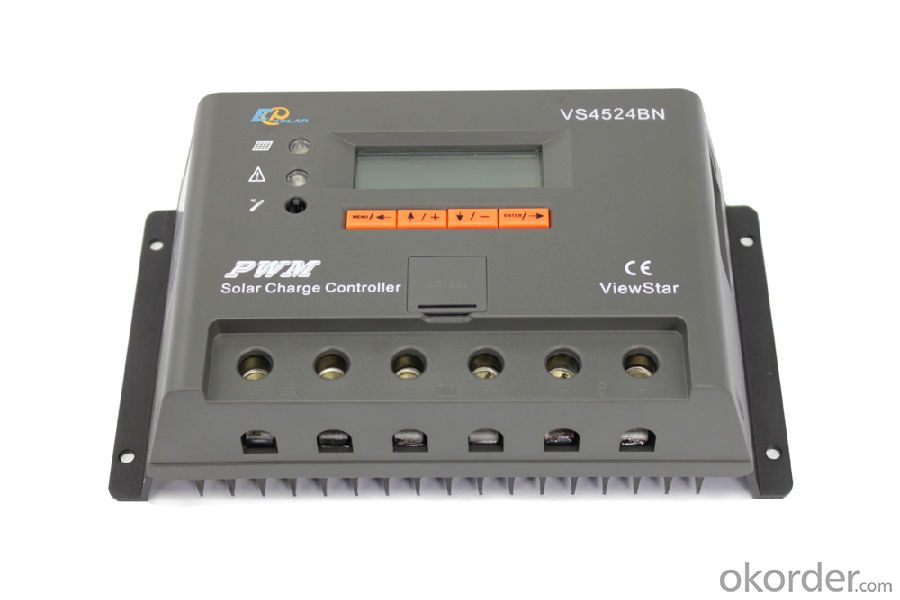
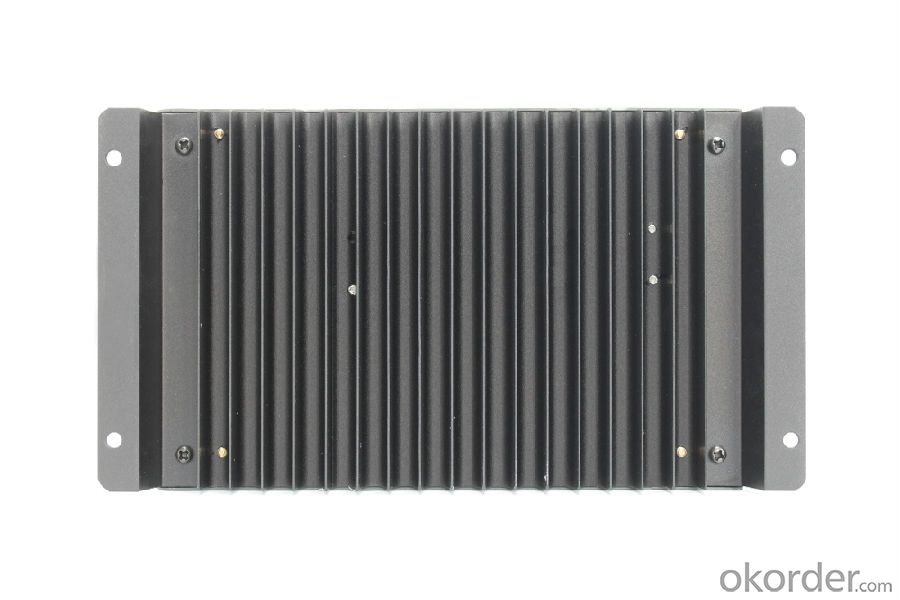
FAQ:
Q1. What is the voltage?
A1. Our 45/60A solar charge controller is 12/24/36/48V auto work.
Q2. What is the difference between MPPT&PWM?
A2. MPPT has higher efficiency, it can track the max power point and won't waste energy.
Q3. What is the efficiency of the MPPT controller?
A3. MPPT>99%, peak conversion efficiency>98%.
Q4. What is the waranty of product?
A4. 12 months.
Q5. What protection does your MPPT controller have?
A5. PV array short circuit, PV reverse polarity, Battery reverse polarity, Over charging, Output short circuit.
- Q: Can a solar controller be used with a solar-powered telecommunications network?
- Yes, a solar controller can be used with a solar-powered telecommunications network. A solar controller helps regulate the power flow from the solar panels to the network by managing the battery charging process and preventing overcharging or damage to the batteries. It ensures that the energy generated by the solar panels is efficiently utilized and stored, thereby maintaining a stable power supply for the telecommunications network.
- Q: Can a solar controller be used with a solar-powered agricultural system?
- Yes, a solar controller can be used with a solar-powered agricultural system. A solar controller helps regulate the charging and discharging of batteries in the system, ensuring optimal performance and prolonging battery life. It helps manage the flow of electricity from the solar panels to the agricultural equipment, allowing for efficient and reliable power distribution in the system.
- Q: What are the advantages of using an MPPT solar controller?
- The advantages of using an MPPT (Maximum Power Point Tracking) solar controller include higher efficiency in converting solar energy into usable power, improved performance in low-light conditions, the ability to handle higher voltage solar panels, and the capability to charge different types of batteries effectively. Additionally, MPPT controllers offer advanced features like data monitoring, remote control, and increased system flexibility, making them a preferred choice in maximizing solar energy utilization.
- Q: What is the role of a display screen in a solar controller?
- The role of a display screen in a solar controller is to provide real-time information and control options to the user. It allows them to monitor and adjust settings such as battery voltage, charging status, load usage, and other parameters related to the solar power system. The display screen also helps in troubleshooting and diagnosing any issues that may arise, ensuring efficient and effective utilization of solar energy.
- Q: Can a solar controller be used with solar panel arrays in series?
- Yes, a solar controller can be used with solar panel arrays in series. The solar controller regulates the charging process and ensures that the voltage and current from the series-connected solar panels are properly managed and optimized for charging the batteries or supplying power to the load.
- Q: Can a solar controller be used with solar-powered charging stations?
- Yes, a solar controller can be used with solar-powered charging stations. A solar controller helps regulate the flow of electricity from the solar panels to the charging stations, ensuring efficient charging and preventing overcharging or damage to the battery. It also helps optimize the energy harvested from the solar panels, increasing the overall efficiency of the charging stations.
- Q: Can a solar controller be used with solar-powered indoor healthcare institutions?
- Yes, a solar controller can be used with solar-powered indoor healthcare institutions. A solar controller is a crucial component of a solar power system as it helps regulate the charging and discharging of batteries and controls the flow of electricity from the solar panels to the connected devices or appliances. In the case of solar-powered indoor healthcare institutions, a solar controller would play a vital role in ensuring that the solar panels are efficiently charging the batteries that power the institution's electrical systems. It would also prevent overcharging of the batteries, which can cause damage and reduce their lifespan. Moreover, a solar controller can help manage the electricity flow during periods of low sunlight or high demand. It can prioritize the use of solar energy for critical healthcare equipment and systems, ensuring uninterrupted power supply even during cloudy days or power outages. By utilizing a solar controller, solar-powered indoor healthcare institutions can effectively harness and optimize the energy generated from solar panels, reducing their reliance on traditional power sources and lowering operational costs. Additionally, solar power is a clean, renewable energy source, which aligns with the principles of sustainability and environmental responsibility commonly associated with healthcare institutions. In conclusion, a solar controller is an essential component for solar-powered indoor healthcare institutions as it helps regulate and optimize the use of solar energy, ensuring reliable and sustainable power supply to critical healthcare equipment and systems.
- Q: How does a solar controller handle the protection against ground faults?
- A solar controller handles protection against ground faults by continuously monitoring the electrical current flowing between the solar panels and the battery bank. If a ground fault occurs, where there is an unintended electrical connection between the solar system and the ground, the controller detects the imbalance in current and immediately shuts off the system to prevent any potential damage or safety hazards.
- Q: Can a solar controller be used with solar-powered indoor electric vehicle charging stations?
- Yes, a solar controller can be used with solar-powered indoor electric vehicle charging stations. A solar controller, also known as a charge controller, is designed to regulate the flow of electricity from solar panels to the battery bank. It ensures that the batteries are charged properly and prevents overcharging or discharging. In the case of indoor electric vehicle charging stations that are powered by solar energy, the solar controller plays a crucial role in managing the electricity generated by the solar panels. It ensures that the charging station receives the right amount of power and that any excess energy is properly stored in the battery bank for later use or fed back into the grid. By using a solar controller, the solar-powered indoor electric vehicle charging station can effectively harness and utilize solar energy, making the charging process more efficient and sustainable. The solar controller helps optimize the charging station's performance, ensuring reliable and clean energy for electric vehicle charging, even in indoor environments.
- Q: What is the maximum battery capacity that a solar controller can handle?
- The maximum battery capacity that a solar controller can handle depends on the specific model and its design specifications. Generally, solar controllers are available in a range of capacities to accommodate different battery sizes. The capacity of a solar controller is typically measured in volts and amps, which determines the maximum voltage and current that the controller can handle. It is important to choose a solar controller that can handle the battery capacity of your solar system. If the battery capacity exceeds the maximum capacity of the controller, it may not function properly or may cause damage to the controller. Therefore, it is crucial to consult the manufacturer's specifications or seek professional advice to ensure that the solar controller can handle the desired battery capacity.
Send your message to us
Solar Panel Controllers - LCD/LED High Quality PWM Solar System Charge Controller/Regulator with CE ROHS, 45A 12V/24V, VS4524BN
OKorder Service Pledge
OKorder Financial Service
Similar products
Hot products
Hot Searches
Related keywords
